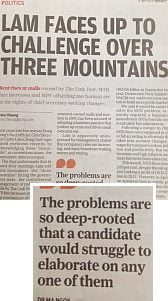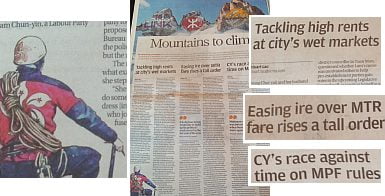The South China Morning Post has recently carried not one but two columns mentioning the resumption (by government) of big developers’ extensive unused land reserves in the New Territories. This would help ease the city’s apparent shortage of residential and other space.
Neither of the authors appears to be a Marxist. However, Libertarian purists would be horrified by the violation of private property rights. (The government would compensate the owners for the land’s current agricultural value rather than its potential worth if rezoned as residential.) They would also detest an alternative (or complementary) solution to the housing shortage, namely to tax empty homes so heavily that owners have no choice but to release them for rent or sale to end users.
It depends on whether you see housing as a human necessity – even a right – or as an investment asset class. Let’s say speculators had cornered the market in rice and were making massive profits selling tiny amounts of their stockpiles as famine swept the land: would the government be justified in sequestering the warehouses of grain to prevent people from starving? What should the authorities do if a speculator had bought up and was hoarding all the supplies of medicine just as a deadly disease broke out?
Ask Hong Kong officials to answer the above questions, and they will seize up. Harming the local property tycoons is absolutely unacceptable, but some deep-down, nagging instinct tells them that letting the whole population perish would also be wrong – their brains will be trapped in a cycle of contradictions.
The SCMP today examines three relatively minor quandaries facing Hong Kong policymakers: rents in public housing retail malls, MTR fares and a specific inequitable feature of the generally crappy Mandatory Provident Fund system.
Chief Secretary Carrie Lam has identified them as ‘three mountains’. If she thinks these relatively minor problems are insurmountable, God help us if she ever has ultimate responsibility for fixing (say) housing, traffic/pollution, poverty or education.
We can, in all modesty, solve Carrie’s three mountains quite easily.
The privatization of the public-sector malls was a Reagan/Thatcher-inspired brainwave of Chief Executive Tung Chee-hwa. The Link REIT’s upgrades to these shopping centres were in many cases overdue, and some gentrification was inevitable. The problem is that subsequent Hong Kong administrations also reduced the supply of land and swamped the  city with Mainland shoppers, thus hugely distorting the market for retail premises. As in other neighbourhoods, stores serving locals were replaced by purveyors of overpriced garbage to idiot visitors.
city with Mainland shoppers, thus hugely distorting the market for retail premises. As in other neighbourhoods, stores serving locals were replaced by purveyors of overpriced garbage to idiot visitors.
The solution is to reverse the distortions by getting the Mainland shoppers out of the equation and releasing more land (hello, developers’ land banks). Government can also level the playing field by boosting tenants’ rights (eg by making, say, seven-year leases compulsory). To Carrie, the rights of Link REIT investors and other landlords are sacrosanct, so her only proposal is to build a new, parallel network of malls – though she knows the ‘shortage’ of land will make this impossible.
The MTR partial-privatization was also the Crop-Haired One’s idea. Basically, re-nationalize or restructure it and stop pretending it can be a for-profit company when it is subsidized by the taxpayer (via land development rights). Despite populist politicians’ screeching, the fares are actually amazingly low – but why shouldn’t they be? It’s a rare case where some proceeds from the land/housing scam are used to benefit Hong Kong residents.
As for the MPF, everyone knows the whole thing is a rip-off. Either scrap it or establish a low-fee alternative – a bunch of index trackers – that all savers are free to switch to, and see if the existing providers can compete by adding rather than subtracting value.
The good news for Carrie, or more accurately Beijing, is that Hong Kong’s housing, traffic, and other problems are not that hard to overcome, either – provided you stop trying to protect and serve vested interests (Thatcher ate vested interests for breakfast, incidentally). Just prioritize.


Seems to me that the worthies who inhabit the administration, along with all the people they associate with and would ever listen to, are generally owners of at least one apartment and usually several. They are invested in the system and nothing, from a policy point of view, will ever be allowed to threaten their fundamental right to obscenely escalating investment growth. Pursuit of self interest is the only reflex more basic to these parasites than the kissing of relevant backsides (of course the two are related).
This misses the point.
The developers would be happy to use the ‘unused’ land, but they can’t because of the agricultural zoning.
They’re not hoarding a precious resource, they are taking a punt on the Government one day allowing them to build by rezoning. The ball’s in the Government’s court.
http://www.ejinsight.com/20160606-buck-stops-here-never-applies-carrie-lam
Like Hemlock, Albert spells out why Carrie Lam should be the perfect CE candidate of both the local oligarchy and Beijing.
@WTF
A fairly good article with one glaring oddity: Albert appears to be labouring under the illusion that the CE is elected by an election committee. Awww, bless!
Wen I read the SCuM earlier I thought that this was the making of Jake vdC column for tomorrow. But it looks like you have beaten him to the punch.
Hardly a mountain dear Carrie, more of a gentle ramble.
Just prioritize? Wasn’t it you who said that we are dealing with a government that tries to “strike a balance” between minibus profits and people not getting run over willy nilly; between keeping construction costs down and people not getting poisoned by heavy metals; or for that matter, between being super racist and sometimes not being so super racist? “Just prioritise”. Sure.
“Thatcher ate vested interests for breakfast”. Only those which benefited the working class – she never met a big businessman she didn’t like.